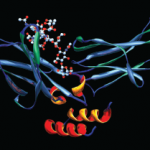WASHINGTON, D.C.—For rheumatologists treating patients with systemic lupus erythematosus (SLE), new research into factors that may lead to life-threatening comorbidities could provide clearer direction on how to treat this population, according to researchers at the 2012 ACR/ARHP Annual Meeting, held here November 9–14. [Editor’s Note: This session was recorded and is available via ACR SessionSelect at www.rheumatology.org.] At the Rheumatology Research Foundation Edmond L. Dubois Memorial Lecture, five investigators presented data on what plays a role in the development of serious comorbidities like lymphoma and thrombosis.
Hydroxychloroquine Use and Thrombosis
In her presentation, Genevieve Law, MD, a researcher at the University of Alberta in Edmonton, examined connections between hydroxychloroquine use and increased thrombosis risk. Women with lupus are more than twice as likely to be admitted to the hospital for a stroke or a myocardial infarction as those without SLE, Dr. Law said.
Higher thrombosis rates may be due to chronic inflammation, renal disease, vasculitis, and high-dose prednisone use. However, hydroxychloroquine may have a thromboprotective effect, she added. Dr. Law and her colleagues enrolled 1,795 patients from the Hopkins Lupus Cohort with no history of thrombosis and found 193 thrombotic events total, including 106 arterial, 83 venous, and four events that were both arterial and venous. Higher prednisone dose, such as 20 mg a day, nearly triples the rate of thrombotic events. Cumulative prednisone use also affects risk but not as strongly, Dr. Law said.
Hydroxychloroquine protects SLE patients from thrombotic events, especially after six months of consecutive use, and the protection is greater in patients who are positive for antiphospholipid (aPL) antibodies, the researchers found. As for nonsteroidal antiinflammatory drug use, naproxen is associated with a lower risk of thrombotic events because of its strong antiplatelet effect, while aspirin at 81 mg a day increased the risk, Dr. Law said. So medications are both an important risk factor and a modifiable one, she concluded.
Lymphomas in Lupus
In her presentation, Sasha Bernatsky, MD, PhD, assistant professor of medicine at McGill University in Montreal, explored the risk of lymphomas in lupus. Out of 15,980 SLE patients from 30 centers, 641 cancers were found. Researchers saw an increased risk of hematologic cancers, especially non-Hodgkin’s lymphoma and leukemia, Dr. Bernatsky said. She looked at how drugs may mediate the risk of lymphomas versus disease activity. Drugs assessed were cyclophosphamide, azathioprine, methotrexate, mycophenolate mofetil, antimalarials, and glucocorticoids.
Although researchers could not establish a clear association between SLE disease activity and lymphoma risk, they did spot a trend toward greater exposure to cyclophosphamide in the cancer cases versus those patients who were cancer free. No one drug was seen as an independent risk factor for lymphoma in SLE, Dr. Bernatsky said. One trend the researchers detected was that, in less than half the lymphoma cases, the patient had been exposed at one time to one of the immunosuppressant drugs. Cumulative steroid use, at 10 mg a day for at least a year, was seen as increasing risk as well, she said.


